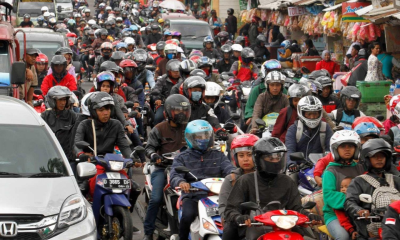Bali introduces stricter motorcycle rental regulations, including mandatory IDPs, safety training, and required protective gear, to improve tourist safety and reduce road accidents.

Subscribe to our Instagram Channel for instant news & updates!
Bali is preparing to introduce stricter motorcycle rental regulations as part of a wider effort to protect visitors who rely on scooters to explore the island. Motorbike rentals have long been an affordable and iconic way to experience Bali’s landscapes and lively towns. However, a rising number of accidents involving tourists has pushed local authorities to rethink the system.
Each year, travellers flock to the island and embrace scooter culture, cruising past Ubud’s rice terraces, weaving through coastal roads, and discovering hidden temples at their own pace. But this freedom sometimes comes with risks, especially for inexperienced riders. A string of serious injuries has prompted renewed scrutiny of rental practices and tourist preparedness.
Bali Introduces Stricter Rules for Motorcycle Rentals
The provincial government has unveiled a series of new requirements aimed at reducing accident rates and ensuring safer riding conditions for visitors. The measures focus on licensing, training, and equipment standards.
A key change requires anyone wishing to rent a motorcycle to present a valid International Driving Permit (IDP). Under the upcoming policy, rental operators will turn away travellers without proper documentation. Officials believe this measure will prevent unlicensed and inexperienced tourists from operating scooters on busy and unfamiliar roads.
The policy also obliges renters to complete basic safety training that covers local traffic rules, riding etiquette, and emergency procedures. Rental companies must also provide helmets, reflective vests, and other essential protective gear to ensure every rider meets minimum safety standards before taking to the road.
The policy aims to build a rental system that prioritises both rider competence and preparedness.
Impact on Tourism and Local Businesses
Motorbike rentals are deeply woven into Bali’s tourism economy. For many small operators, scooter rentals are a primary source of income and a reliable service for visitors who prefer independent travel. The new regulations may create initial challenges. This is particularly so for businesses that must upgrade equipment, adopt new procedures, or turn away riders who lack proper licensing.
Even so, tourism authorities believe the long-term benefits outweigh the short-term adjustments. They expect the measures to increase visitor confidence, especially among travellers who previously avoided rentals due to safety concerns. A safer riding environment, they argue, ultimately enhances Bali’s reputation as a responsible and traveller-friendly destination.
Road Safety Concerns Continue to Grow
Bali’s scenic roads are one of its biggest attractions but they can be difficult to navigate, especially for newcomers. Narrow village lanes, unpredictable traffic flow, fast-paced highways, and winding mountain passes often catch inexperienced riders off guard. Many tourists underestimate the challenges, leading to preventable accidents each year.
By improving safety training and enforcing proper licensing, authorities hope to reduce incidents and better prepare visitors for the island’s diverse road conditions. Education, they say, is key to ensuring tourists understand the realities of riding in Bali before they set off.
Part of Bali’s Broader Push for Sustainable and Responsible Tourism
The motorcycle rental reforms are part of a larger shift toward sustainable tourism on the island. Bali has been investing in waste management improvements, eco-friendly tourism programs, village stewardship initiatives, and long-term environmental strategies. Safety is increasingly viewed as an essential component of sustainable tourism. This is to ensure travellers can enjoy the island without putting themselves or local communities at risk.
By integrating safety-focused policies into its tourism framework, Bali aims to create a more balanced and resilient industry that protects both its natural environment and its visitors.
Looking Ahead: A Model for Other Tourist Destinations
As global tourism trends emphasise responsibility and safety, Bali’s upcoming regulations reflect a proactive approach to managing a booming tourist economy. Officials hope that, over time, the new rules will reduce the number of avoidable accidents, improve visitor experience, and strengthen the island’s standing as a safe and sustainable destination.
With tourist numbers continuing to rise and rental scooters remaining central to the island experience, these changes represent an important step in shaping Bali’s future tourism landscape, one that values safety, sustainability, and long-term visitor trust.































Facebook
Instagram
X (Twitter)
YouTube
LinkedIn
RSS